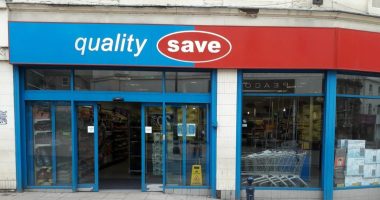AFTER being rejected for a mortgage for the third time, Ricky Hunter told his wife he had given up on their dream of buying a home.
His poor credit history had so far scuppered his chances of getting a mortgage deal – but one specialist lender agreed to loan him the £96,900 to make his home ownership dreams a reality.
Operations director Ricky Hunter, 34, and his wife Leanne, 32, had run into trouble getting a mortgage because of their history of debt.
The couple had racked up £22,000 of debt seven years ago, while starting a new family and spending too much cash.
Although they paid off every penny, they have since found themselves in debt once again, and now owe £4,000.
It meant lenders were wary of lending the family money to buy their home – but a specialist mortgage broker eventually helped them get a deal.
They also used the Right to Buy scheme – a government intiative that lets council house tenants buy the property they rent.
The scheme lets anyone renting a council property buy their home at a reduced price to help them get on the ladder – and Ricky got a massive £73,100 knocked off the price of his home.
Most read in Money
They ended up paying £96,900 for the house – even though it was valued at £170,000.
Using the scheme let them bag their home much quicker than they thought – as they didn’t need to put down a deposit.
The house was finally theirs in December last year.
We sat down with Ricky to chat through how he overcame these challenges to become a homeowner for The Sun’s My First Home series.
Tell me about your house
It’s a three-bedroom house in Corby, Northamptonshire.
It has one bathroom, and an open-plan kitchen and dining room.
There’s a good sized garden – half of it is patioed and the is lawn.
We have three dogs, a tortoise and a pet fish – so along with the three kids, we’re a full house!
How did you decide on location?
Because we bought the council house we were already in, we didn’t have to go through the stress of searching for properties, or moving to a new location.
We used the Right to Buy scheme to buy the house – it lets anyone renting a council property buy their home at a reduced price.
How much cash you can get off – and if you’re eligible for the scheme – depends on how long you’ve been a tenant with your public sector landlord, how much the property is worth, and whether you are buying a flat or a house.
The maximum discount a buyer can get is £112,800 in London, and £84,600 for homes across the rest of England.
Buying our council house was a no-brainer – it’s near the kids’ school, close to work and my sister lives on the same street.
How much did you pay for it?
The house was valued at £170,000 but I got a 43% discount and bought it for £99,600.
You get a 35% discount off your house if you’ve lived there for three to five years.
After five years, you get an extra 1% discount for every extra year you’ve been a tenant.
I had lived in my house for 13 years, meaning I got a total of 43% off the value of the house – a reduction of £73,100.
I took out a £96,900 mortgage for the house, and didn’t have to pay a deposit – that’s because many lenders don’t require one for a Right to Buy purchase.
My mortgage term is 35 years at a two-year fixed rate of 3.59%.
The monthly mortgage repayments work out at £415.69 – not much more than the £400 a month I was paying in rent.
Were there any complications?
There were so many challenges buying my council house that we nearly gave up on our dream of owning it.
It was three years ago that we first started thinking about buying the property.
We had looked into the Right to Buy scheme and knew it was the route we wanted to go down.
But we were told by the council that we needed to have a mortgage offer in place in order to apply for the scheme.
We started trying to line up a deal but were rejected three times because of my poor credit history.
About seven years ago, we had racked up a debt of around £22,000.
We were using credit cards to buy furniture and appliances for the house when we started a family, and splashed out on silly stuff like computer games and gadgets we didn’t need.
It got to a point where I faced up to my situation and began to seriously start paying it off.
I contacted all the companies I owed money to and came to an agreement of what I could afford to repay each month.
My wife got a job, as by then the kids were old enough to go to school.
We cut down on everything, switching providers to reduce our bills and cutting our food shopping budget in half.
I paid it all off in three years, which was a massive achievement.
But now we’re £4,000 in debt after I used credit cards to pay for my bills and outgoings when I had to take three months off work for personal reasons.
My financial situation meant mainstream lenders weren’t prepared to lend me the money when we were applying for a mortgage.
After the third rejection, I had given up.
I assumed I would stay renting my home forever – and the thought made me sick to my stomach.
If it wasn’t for my wife encouraging me to apply again, I would never have believed we could own our home.
How did you overcome these challenges?
We got a new mortgage adviser who was more experienced dealing with people with poor credit history, and he looked into specialist lenders.
We finally got a mortgage offer from Together.
However, specialist lenders often charge a higher interest rate than a deal you’d get from a traditional lender.
You could be paying 1 or 2 percentage points more interest than some of the lowest rate deals on the market currently.
This is because people with poor credit scores are considered more risky to lend to.
That means you need to shop around and look into as many deals as possible to see if you can get a better rate.
How did you save for it?
Because we didn’t need to save up for a deposit, we didn’t need to put too much aside to cover the costs of buying the house.
However, we needed around £6,000 to cover all the solicitors and brokers’ fees.
As well as my day job, I took on extra work at the weekends, doing DIY jobs around the area.
I’d raise around £400 a month extra from doing this.
We put days out and trips on hold, as well as any spending on non-essential items for about 12 months and that saved us £500 a month.
Advice for first-time buyers?
Even if you have been in a bit of financial trouble previously, don’t scrap your dreams of buying a home.
If you want it enough you can get it – just make sure you get a good mortgage broker to help you hunt for deals.
Cut out all the silly stuff you might be spending your money on but don’t need.
That includes shopping for clothes and other unnecessary bits.
We pay for your stories!
Do you have a story for The Sun Online Money team?














